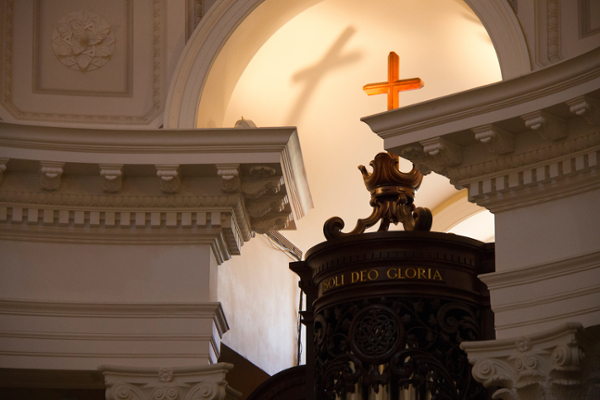
“Now they know that everything you have given me comes from you. For I gave them the words you gave me, and they accepted them. They knew with certainty that I came from you, and they believed that you sent me.” John 17:7-8
Jesus is confident. On the eve of his crucifixion, Jesus’ prayer expresses a settled confidence not only in his finished work but in the certainty of the disciples’ conviction. This is the kind of report that receives the Father’s commendation, “Well done good and faithful servant enter into the joy of your reward.” Only in his case, it is the Son, not the servant, that has successfully completed the Father’s work. Jesus measures the success of his mission by the certainty of the disciples. Because they knew with certainty that Jesus’s every act, his every word, and his very being were from the Father, they believed that he was sent by the Father and was one with the Father. The joy of being able to pray this way before the cross must have been deeply encouraging to Jesus. The Christ-centered certainty of the first disciples forms the foundation for the faith of all Christ’s followers. This is the certainty that calms our anxiety; the clarity that cuts through our confusion.
The New Testament epistles thrive on this certainty. There is nothing vague or tentative about the early church’s confident certainty in Christ. Hebrews begins by declaring boldly that true spirituality is not found in a vague, undefined emotive feeling that stirs the self. True spirituality is not to be confused with soul-inspiring music or incredible sports plays or altruistic acts of human kindness. These are all wonderful, but true spirituality is found in the specific revelation of God found in Jesus Christ.
Vague notions of Christ formed in our imagination are dismissed in favor of the Son who is “the exact representation” of the Father. Confidence is placed in the One who “is the very image of the essence of God – the impress of his being.” The Son is the “perfect imprint of the very being of God.”[1] “What God essentially is, is made manifest in Christ. To see Christ is to see what the Father is like.”[2] There is no generic, nameless, pre-Christian deity to be known. Only God the Father, Son, and Holy Spirit can be known, and only the Son reveals the very being of God.
This is why we exegete the Gospels, because they exegete the life of Jesus. This is why we expound the Epistles because of the truth that is in Jesus (Eph 4:21). This is the bold truth celebrated throughout the Bible. The apostle John writes,
“That which was from the beginning, which we have heard, which we have seen with our eyes, which we have looked at and our hands have touched—this we proclaim concerning the Word of life” (1 John 1:1-2).
Commenting on the difference between gospel-centered clarity and cultural Christianity, missiologist Timothy Tennent writes,
“When you walk into a vibrant church, you can immediately sense the difference. At every point, you meet gospel clarity. The church exudes confidence in the unique work of Jesus Christ. They understand the power and authority of God’s Word. They feel the lostness of the world and the urgency to bring the good news to everyone. At every point, you observe gospel clarity. . . .The clarity is palatable. It is infectious. You can actually sense the presence of Christ in your midst.
In contrast, when you walk into the churches in decline you are immediately brought into 'the Fog.' What is the fog? It is the inability to be clear about anything. There is no clarity about who Jesus Christ is and what He has done. There is no clarity about the Scriptures as the authoritative Word of God. There is no clarity about the urgency to reach the lost. . . . In the “fog,” Jesus Christ is just one of many noble teachers in the world.”[3]
Jesus’ confidence in the first disciples' certainty is a challenge to contemporary believers. He believed in his original band because they believed in him. Their four-fold confidence in Jesus’s acts, words, being, and mission depended directly on the Father and was meant to be embraced confidently by today’s believers—by you and me. Apostolic Christology needs to be our Christology! At the outset of his ministry, when the people were impressed by his signs, John reports that “Jesus would not entrust himself to them, for he knew all people” (John 2:24). Now, in his final prayer with his disciples before the cross, Jesus revels in the believing certainty of his disciples' faith in him.
[1] Gareth Cockerill, The Epistle to the Hebrews (Eerdmans, 2012), 94.
[2] F. F. Bruce, The Epistle of the Hebrews (Eerdmans, 1990), 48.
[3] Tennent, “Gospel Clarity vs. ‘The Fog.’” posted 12/16/14 at www.timothytennent.com.
